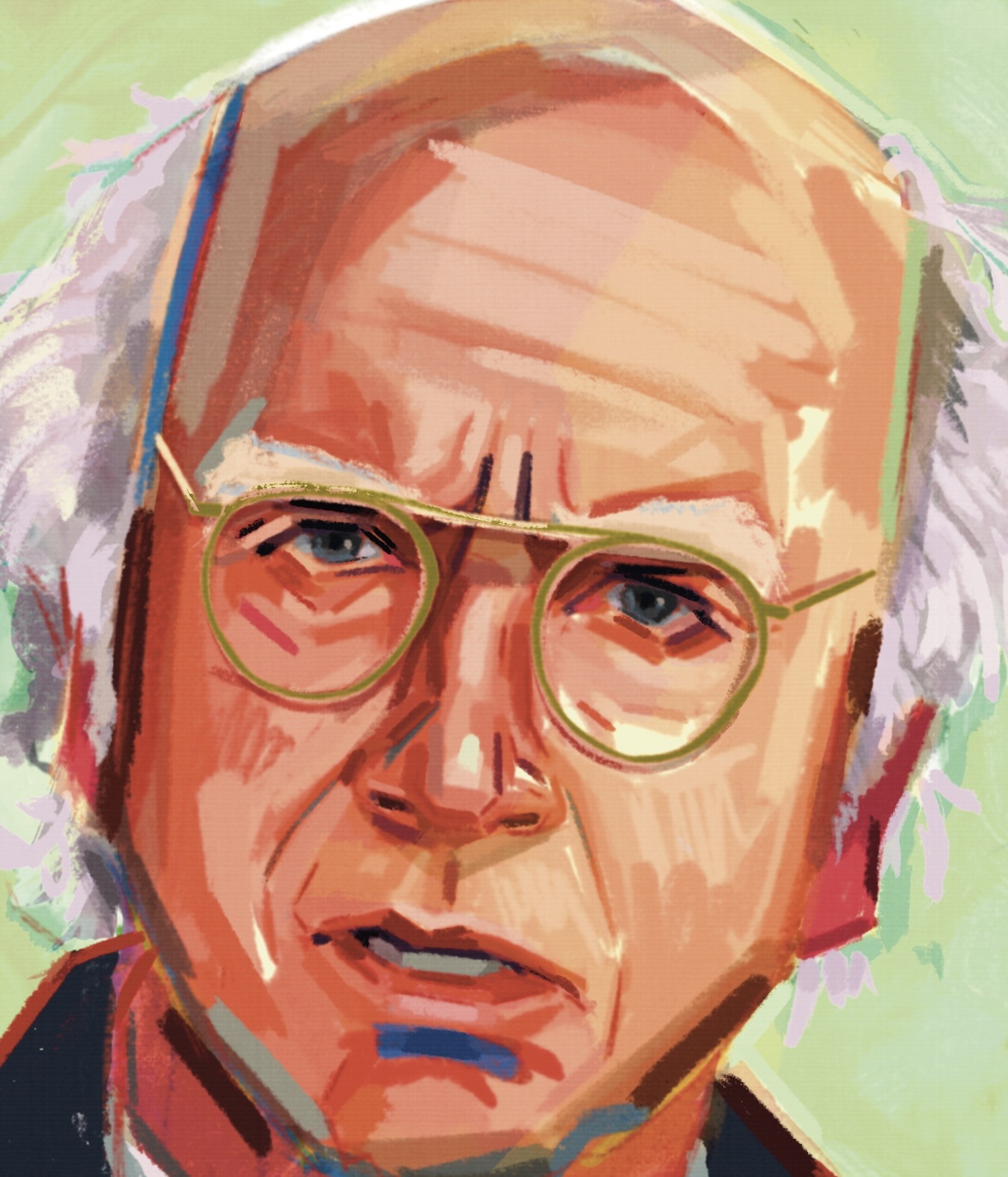In the 12th and final season of Curb Your Enthusiasm, Larry David—a character based on and played by creator Larry David—pressures a busy hotel housekeeper to fish his glasses out of the toilet. He whines about having to pay a big “condolence tip” to an inattentive waiter whose mother just died. He muses to his permanent houseguest Leon Black (J.B. Smoove), who is Black, “I wonder if a Black man going to Africa is like a Jew going to Israel,” and berates Leon’s aunt in her own home. He calls Apple’s Siri the C-word. And that’s all in the first episode.
Since Curb debuted on HBO in 2000, fans have relished such excruciating scenes, where Larry’s unique combination of privilege and neuroses unleashes politically incorrect chaos. With his manager Jeff Greene (Jeff Garlin) and, since Season 6, Leon as accomplices, he makes an art of causing offense. No one is safe from his trifling. Women, kids, people of color, members of the LGBTQ community, service workers, characters with disabilities, and adherents of every major religion and political orthodoxy have all been targets of his tirades.
The fictional Larry David wouldn’t last a day in the public square ca. 2024. But the real Larry David never seems to get canceled, no matter how many cultural third rails he touches. It’s quite a feat at a time when the discourse around comedy is so combustible. The social media masses scrutinize SNL hires’ podcasts and awards-show hosts’ old jokes. Right-wing pundits sic their viewers on comedians who mock their pet causes. Onetime liberal heroes from Louis C.K. to Dave Chappelle have been knocked off their pedestals (though hardly intimidated into retirement) by reports of sexual misconduct and anti-trans humor, respectively.
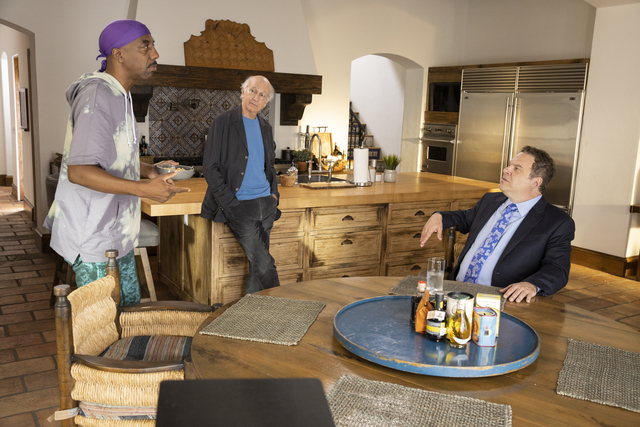
David, by contrast, is more widely beloved—and cooler—than ever. Though he’s a 76-year-old boomer with what the Wall Street Journal approvingly described as a “boring-dad look,” his fandom spans generations.Magazines like GQ hail him as a fashion icon. He gets name-dropped by Natasha Lyonne and Ayo Edebiri. In 2021, the same year streetwear brand Kith released a Curb collab., he set the internet ablaze by engaging in perhaps the most Gen Z activity possible: sipping espresso martinis with Timothée Chalamet. David had another viral moment this past week, when he playfully attacked Elmo from Sesame Street live on the Today show, then apologized to the puppet between fits of laughter. The incident played like a parody of bad celebrity behavior (see: Will Smith slapping Chris Rock at the Oscars). And really, is there anyone over age 5 who can't identify with the urge to throttle Elmo?
For 24 years, the critical distance and self-deprecating humility that separate comedian from character have saved him from provoking the kind of outrage his avatar so relentlessly sows. He has, for the most part, managed to send up the universally irritating virtue signaling of rich liberals (among other in-groups) and channel the unspeakable frustrations of viewers without endorsing actual bigotry or injustice. And in 2024, as the show airs its final episodes, the misanthropy Curb radiates has never felt more timely.
Larry David the Curb antihero, tellingly referred to by the real David as “TV Larry,” has been classified by more scholarly minds than mine as a quintessential schlemiel. The Yiddish term encompasses a range of pejorative types, from chump to fool to awkward bungler. What makes TV Larry more interesting than your average schlemiel, and his transgressions more fraught, is his success. Set for life thanks to residuals, the Seinfeld co-creator meanders around Los Angeles’ wealthiest neighborhoods, playing golf, making scenes in restaurants, and taking on inessential projects. One season it’s a role in The Producers on Broadway; in another, he opens a “spite store” to compete with a coffee-shop owner who was rude to him.
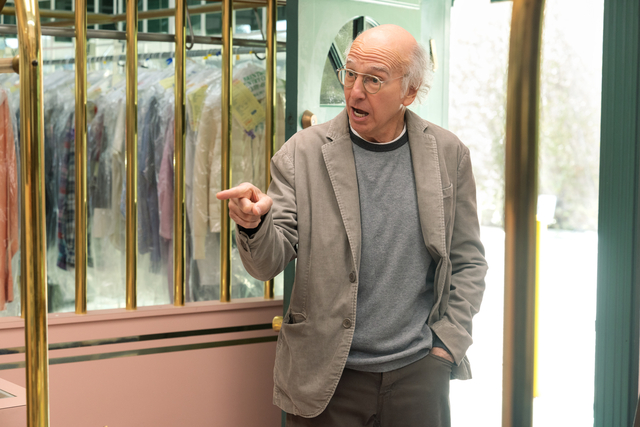
Like a Seinfeld character, but more so because he has infinite free time, Larry obsesses over minutiae. He escalates every conflict, no matter how inappropriate. When Michael J. Fox (one of many celebrities who appear as themselves) shakes his head in Larry’s direction, Larry demands to know if it was a gesture of disapproval or an involuntary “Parkinson shake.” Despite being a know-it-all who’s convinced everyone else is doing life wrong, he doesn’t seem to know much at all. (“What’s the difference between Harriet Beecher Stowe and Harriet Tubman?” he wonders idly in one episode.)
He’s not alone in his failings. Jeff is a buffoon, always setting off his shrill, tacky wife Susie (Susie Essman). Leon’s life revolves around, as he puts it, “tappin’ ass.” Larry’s friends, much like his foes, are hypocritical, bratty, priggish, lazy. He’s just the same, except less tactful. In the misanthropic world of Curb, everyone is a pathologically annoying product of their own pettiness, ignorance, prejudices, and hangups—Larry more than most.
It is these warped egos that fuel the show’s incandescent social pyrotechnics. In an episode often cited as the series’ best, “Palestinian Chicken,” Larry and Jeff frequent a Palestinian restaurant, where they feel uncomfortable as Jews, because they love its chicken. Larry is so desperate to maintain his good standing there that he gets into a fistfight with his suddenly pious friend, Marty Funkhouser (the late Bob Einstein), for showing up to lunch in a yarmulke. The altercation endears him to the establishment’s sexy proprietor, Shara (Anne Bedian); soon they’re in bed, getting off on calling each other offensive names. The episode ends with Larry standing frozen between two sides of a demonstration: a mob of Jews, led by an irate Susie, protesting the restaurant’s new location next door to a Jewish deli and an equally angry Palestinian counterprotest led by Shara. Cue Luciano Michelini’s queasy theme music.
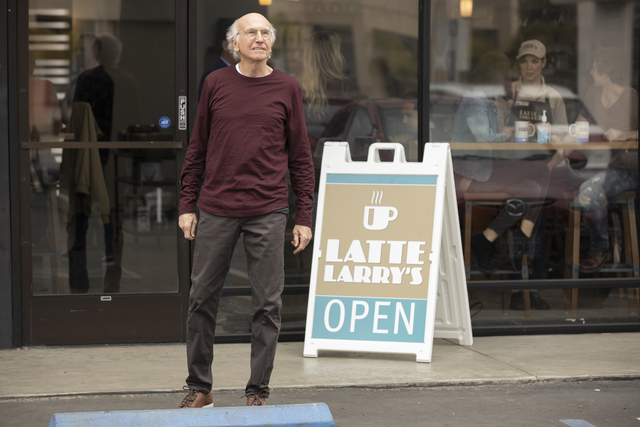
“Palestinian Chicken” is not really a statement about Palestine or Israel or antisemitism or geopolitics. The characters’ identities are just a medium for exposing their self-involvement. Marty and Susie are pathetic for believing their interference with a small business constitutes righteous political engagement. Jeff, Shara, and above all Larry are not mouthpieces for their people; they’re just selfish pleasure seekers. True to David’s Seinfeld-era “no hugging, no learning” credo, not one character gleans an iota of wisdom from the conflict.
When staging screaming matches between people of all identities on the most sensitive of topics, it helps to seek input from the performers involved. Curb has always had a uniquely effective way of doing so. Because episodes are improvised from outlines rather than scripts, the actors are writing their own dialogue as cameras roll. In a 2004 New Yorker profile, David invoked a memorable rapper character named Krazee-Eyez Killa, played by Chris Williams, as an example of why this approach was so effective: “Could I have written those words in a million years better than that guy said them? No f-cking way! I wouldn’t have had the balls to do it!”
The humility inherent in this approach, which echoes David’s own self-deprecating performance, is hard to come by these days, when popular stand-ups from Chappelle to Amy Schumer traffic in sociopolitical sanctimony and position themselves as experts on experiences not their own. To a certain extent, Curb functions as a parody of precisely these tendencies.
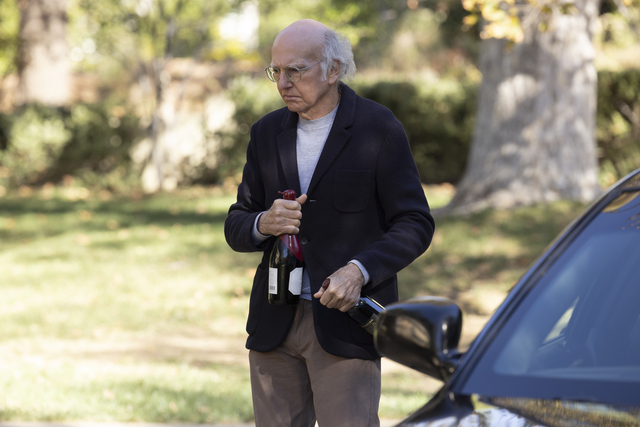
This is not to say that the show or its creator has a perfect track record. A trans actress walked out of a Curb audition in 2015, in response to a joke, which never aired, that she deemed transphobic. Not every gag that makes the cut lands, either; an episode, “The Bare Midriff,” built around a woman who bares her flabby stomach at work, feels mean more than funny. Not every choice made in early seasons, such as Larry’s casual use of the N-word in “Krazee-Eyez Killa,” has aged well. Neither did the FTX Super Bowl ad David starred in less than a year before the company’s collapse. Curb’s cast includes actors who’ve faced reasonably justified public scrutiny, like Garlin, who left ABC’s The Goldbergs in 2021 amid accusations of on-set misconduct (which he disputed). Cheryl Hines plays Larry’s ex-wife but is in real life married to the conspiracy-minded presidential candidate Robert F. Kennedy Jr. (David had an amusingly frank response to Kennedy’s comment, last year, to the New York Times that the candidate felt “support and love” from Hines’ friends: “Yes love and support, but I’m not ‘supporting’ him.”)
If what redeems David’s diciest provocations is the genuineness of his commitment to equal-opportunity offense, with TV Larry bearing the brunt of real Larry’s jokes, then it’s his unsparingly bleak vision of society that gives his humor its thrilling edge. Rather than a tangle of systemic forces privileging and oppressing whole categories of person, Curb throws open the gates of a global asylum run by 8 billion maniacs, all weaponizing their differences against one another. Some, myself included, would argue that individual psychology and structural inequality are inextricably connected. But the asylum metaphor certainly captures the mood of an era of anger and delusion, as unhinged internet invective increasingly erupts into physical space.
David responds to rampant hysteria not with holier-than-thou political polemic, but with confirmation that, in exasperated spirit if not in material circumstances, he’s scrapping in the muck with the rest of us. The more the world goes to hell, the more relatable—across generations and identities—his incorrigibly cranky alter ego becomes. The same goes for David’s trend-averse personal style, which reads as an almost punkish gesture of refusal. It’s no wonder that his hermit-like existence, the utter delight he evidently took in social distancing, made him a guru of COVID lockdown. (He also correctly diagnosed the notoriously tone-deaf celebrity “Imagine” video that circulated early in the pandemic as “crazy.”)
In that sense, maybe David’s indifference to cancellation—the fact that he neither fears blowback nor, like so many discourse-poisoned comedians, obsesses over his haters— is the superpower that makes him invulnerable to it. As showrunner Jeff Schaffer, speaking in January about the end of Curb, put it: “People need Larry, although the feeling is not mutual.” What could possibly be cooler?
Correction, Feb. 5
The original version of this story misstated the relationship between Leon and a character Larry David berates in Curb's Season 12 premiere. She is Leon's aunt, not his mother.
More Must-Reads From TIME
- The 100 Most Influential People of 2024
- Coco Gauff Is Playing for Herself Now
- Scenes From Pro-Palestinian Encampments Across U.S. Universities
- 6 Compliments That Land Every Time
- If You're Dating Right Now , You're Brave: Column
- The AI That Could Heal a Divided Internet
- Fallout Is a Brilliant Model for the Future of Video Game Adaptations
- Want Weekly Recs on What to Watch, Read, and More? Sign Up for Worth Your Time
Contact us at letters@time.com
